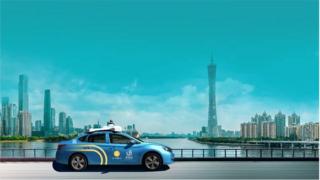[ad_1]

Image copyright
WeRide
The rise of self-driving taxis in China comes at a time when people are nervous about taking public transport.
Robotaxi providers plan to ramp up the number of driverless cars they are putting on the roads to cater to the increased demand.
One of the leading players AutoX is rolling out 100 autonomous vehicles in Shanghai by June.
The start-up is one of several Chinese companies quickly moving to offer self-driving taxi services to the public.
“The pandemic has made our society realise that we need self-driving cars for situations like this,” said a spokesman for AutoX, which is backed by Chinese internet giant Tencent. “RoboTaxi with its self-disinfecting capabilities and driverless logistics could save lots of lives.”
Internet search engine Baidu, China’s answer to Google, is rolling out a fleet of 75 of its Apollo robotaxis across three cities in China. Baidu worked with a number of carmakers including Toyota, Honda and Ford for the development of Apollo.
“The epidemic highlights the large demand for autonomous driving technologies during special times,” said Duanling Fu, a spokesman for Baidu. “We and partners are already using driverless vehicles during the epidemic and we’ve deployed 104 driverless vehicles across 17 cities to help with disinfection, delivery and transportation of goods.”
Image copyright
WeRide
During this first phase the robotaxis will not be truly driverless as they need a human safety driver at the wheel. “The safety drivers will be phased out- that is absolutely the intention of this service,” added the AutoX spokesman. “Virus spread will be a concern for a long time, so this strongly motivates this type of automation.”
In February, the Chinese government issued a blueprint for the development of intelligent vehicles, to speed up the mass production of high-level autonomous cars by 2025.
Image copyright
Getty Images
Pony.ai, founded by former Baidu and Google engineers, received $400m (£325m) in funding from Japanese carmaker Toyota in February, pushing its valuation to $3bn.
The firm has been trialling robotaxis in both China and the US. James Peng, cofounder of Pony.ai, said the pandemic could prove to be an “accelerator” of the trend towards autonomous driving.
Guangzhou-based WeRide has partnered with Chinese state-owned Baiyun Taxi Group to test a fleet of 40 cars. WeRide said it expects fully driverless robotaxis to be ready by 2021.
Another area for potential growth for robotaxi providers is driverless deliveries, given the sharp rise demand for shipping packages and groceries during the coronavirus lockdown.
[ad_2]
Source link
